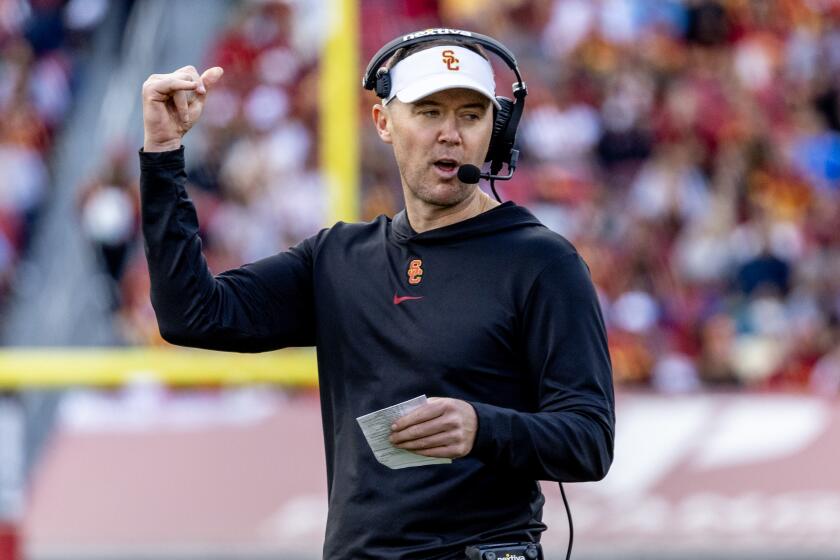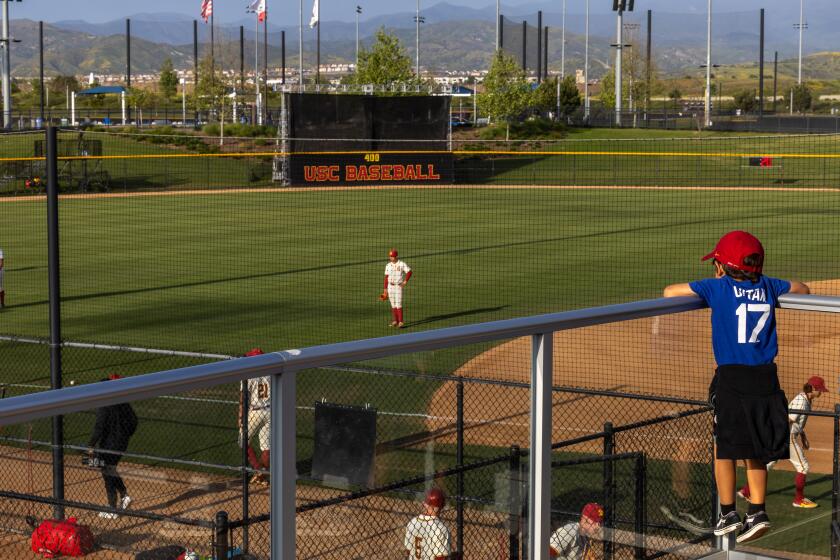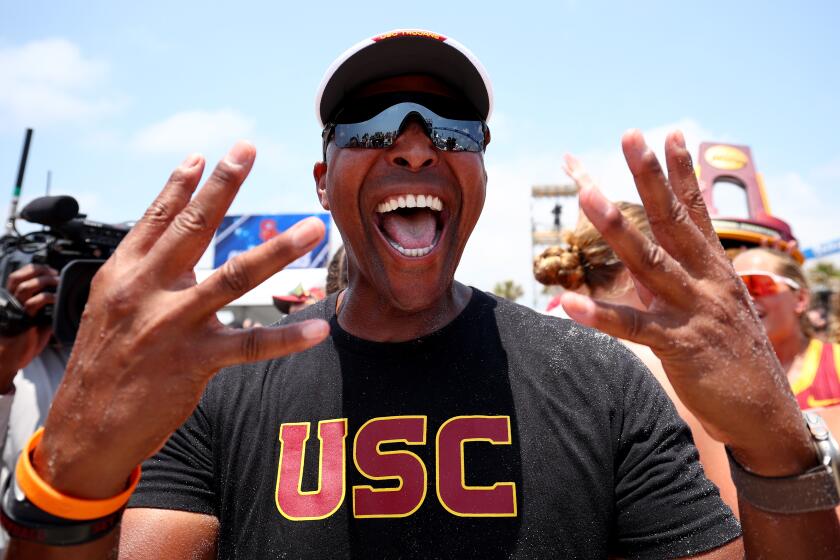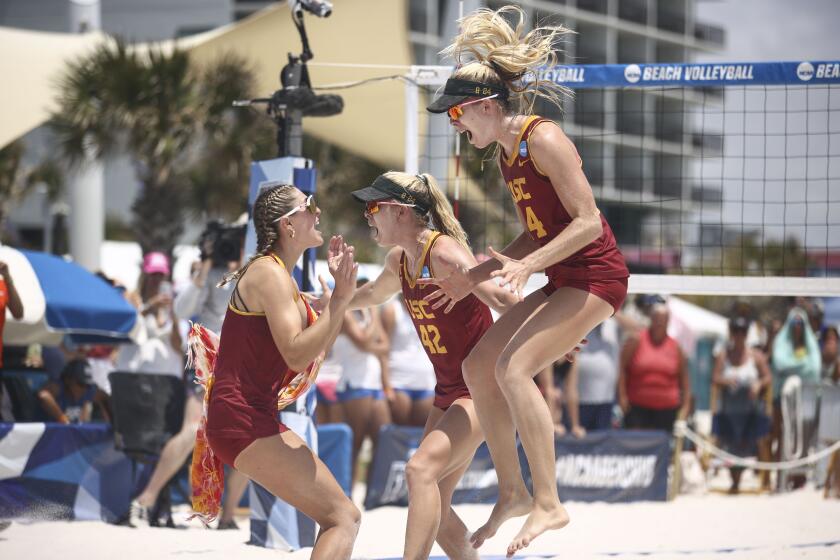Studies Are a Snap : USC Center Jeremy Hogue Works Toward Rhodes Scholarship
If you can remember drinking coffee, popping No-Doz and studying all night for a college economics exam, and then being grateful for getting a C, you’ll find USC center Jeremy Hogue a very annoying guy.
Hogue’s 3.85 grade-point average ranks him No. 2 academically on the Trojan football team. He aspires to be a Rhodes scholar.
So here, you figure, is a guy who has absolutely no fun, watches no TV, has no social life and either studies all night or arises at 3 a.m. to study and write papers.
None of the above.
“I study about two hours a night, if I have a test the next day,” he said. “If I have a paper due, I’ll start it two nights before. I really don’t study that much. I socialize, and I have a girlfriend, just like other guys on the team.
“People assume because of my grades I’m a student who happens to play football. I’m not. I love football. I’m not a speed reader, but the Lord has blessed me with very good reading retention. I can read 200 pages of something and pretty much remember all of it.
“I’m in bed by midnight every night and I sleep in to around 9.”
Further, he tries never to miss his favorite TV shows, “Coach,” and “Home Improvement.”
Hogue, a senior with two years of football eligibility remaining, is two classes shy of a degree in political science. Only sophomore defensive lineman Matt Keneley has a higher GPA, a 3.93.
Hogue made the Pacific 10 Conference’s all-academic first team after last season.
He has been on the dean’s list every semester, is a Phi Beta Kappa member and has had two B’s in four years--A’s in everything else.
He will have earned his degree after this semester. Next year, in his senior football season, he will be a graduate student in USC’s business administration program.
If this keeps up, he has a chance to become the Trojans’ only athlete, other than Pat Haden in 1975, to earn a Rhodes scholarship. Rhodes scholars study at Oxford with tuition and fees paid and are given a living allowance.
In addition to high academic achievements, candidates must display “qualities of character, leadership and personal vigor.”
Fred Stroock, USC’s assistant athletic director in charge of academic services, says Hogue’s writing ability, not his near-photographic memory, will help him most on his Rhodes scholarship application next year.
“A photographic memory, if applied effectively, can be a sign of great intelligence,” he said.
“But Jeremy can really write well, and good writing is a prime determinant in Rhodes consideration. He’s an excellent writer, and it comes easy to him.”
Haden said the Rhodes application process is nearly as fulfilling as the scholarship.
“The odds are against you from day one,” he said. “There are 100 to 200 applications every year from California alone. You wind up with 32 from the United States finally getting a Rhodes, about 75 worldwide.
“A key factor is getting to the final 14 in your state, and getting to the interview stage by a committee of ex-Rhodes scholars. From there on, interviews are critically important.
“Before the committee, you might be asked a question about a story in that day’s newspaper, about political science, about the importance of sports in an academic environment--nothing you can prepare for, in other words.”
Hogue, the son of an Oklahoma City nondenominational minister, says he will apply from his home state, Oklahoma, where he figures he will have a better chance.
Haden, 41, a mid-1970s USC quarterback who played six seasons for the Rams, lives in San Marino. He’s a partner in the venture capital firm of Riordan, Lewis and Haden, and is also an attorney.
“The Rhodes scholarship was absolutely the most phenomenal experience of my life,” he said. “I’ll never forget the dinners, sitting around a table with extremely well-read people and discussing either a great issue of the day or a great issue of 100 years ago.
“The chairman of the USC English Department was the first one who suggested I try for one. I didn’t even know what a Rhodes was. All I knew was that Bill Bradley got one.”
Twenty years later, Haden says, he is struck by how many remember him as much for his Rhodes scholarship as for his USC and Ram football days.
Former Times reporter Bryce Nelson, now on the USC journalism faculty, coordinates Rhodes applications for USC students.
“It’s a demanding application process,” he said. “First, you have to write a 1,500-word essay on why you want a Rhodes. Then, your university has to nominate you for one, well before you get to the interview process.
“The interviews are extremely important, and there are a lot of smart people who don’t interview well.”
Only seven USC students have been awarded Rhodes scholarships since 1913, Nelson said, the last in 1990.
Stroock said Rhodes selectors view candidates who are athletes as they would a candidate who is a student-body president or a student-newspaper editor. But Haden says some Rhodes selectors are biased against athletes.
Stroock said, however, “If a candidate has blended football with academics successfully, selectors are intrigued with that, since it shows very good time management.”
Hogue makes it sound like football success is much harder to come by than classroom success.
At 6-feet-4 and 270 pounds, he’s a runt in the Trojans’ massive offensive line, where Tony Boselli, Norberto Garrido and Phalen Pounds all stand at least 6-7 and weigh more than 300 pounds each.
Last season, Hogue was an untested sophomore when he was thrust into a starting assignment. Starting guard Joel Crisman suffered a foot injury and Hogue filled in for four games. Coach John Robinson switched Hogue to center last spring, and he’s now battling another junior, Robert Loya, 6-2 and 285, for the starting job.
Hogue’s development was sidetracked last spring when he underwent surgery to repair a herniated disk. He says he’s fit now and unofficially the No. 1 center, with Loya sidelined because of a foot injury.
Hogue’s family moved from Oklahoma to California, then back again, and Hogue went to El Toro High, where he was a teammate of USC quarterback Rob Johnson and linebacker Brian Haas. All three played for Johnson’s father, Bob Johnson.
“Jeremy’s a quick learner, an extremely bright kid who asks a lot of good questions,” Bob Johnson said.
“If anyone forgets his assignment, they can ask Jeremy. He knows what everyone’s supposed to do. He may find himself up against someone who’s bigger and stronger, but he’ll find a way to beat him.
“My wife thinks Jeremy’s great. She thinks he’s going to be President of the United States.”
USC offensive line coach Mike Barry, while acknowledging that Hogue plays with great intelligence, says he does have shortcomings.
“He’s a long way from being where Craig Gibson (the graduated previous starter) was as a center, but he’s such a bright kid, he understands how to get there,” he said.
Hogue accepts the criticism, but believes his grit will sustain him as the starter.
“I play low and I never quit,” he said.
Now, about those two B’s . . .
“One was in English composition, in a class where no one got an A,” Hogue said. “The other was in cinema. I thought all I’d have to do is watch movies. But everything I turned in came back with a B on it.”
He says he enjoys debating points of political and social philosophy with “liberal” USC professors.
“I’m very conservative politically, and I’ve become even more so at USC, after debating with professors,” he said.
Go beyond the scoreboard
Get the latest on L.A.'s teams in the daily Sports Report newsletter.
You may occasionally receive promotional content from the Los Angeles Times.



